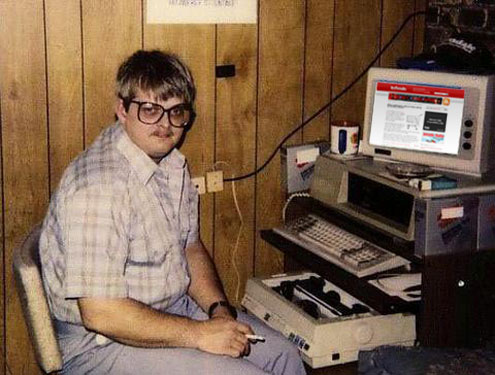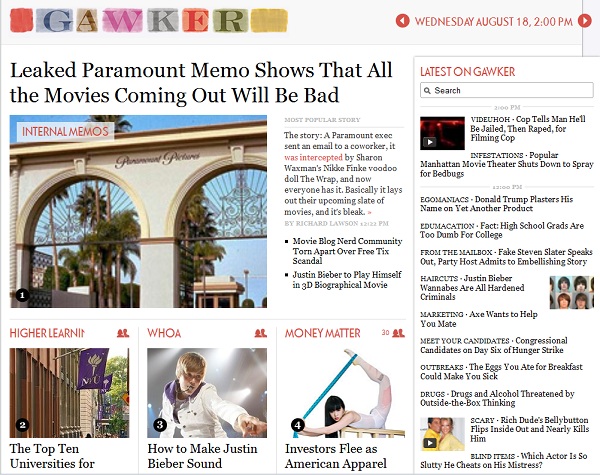First, just to be clear: the web is not dead. Despite Chris Anderson’s attempt to create another catchphrase like the “long tail”, his attempt to say that the traditional browser-based web is finished – and was about to be replaced by closed ecosystems like Apple’s App Store – was a stretch.
There are variety of reasons that Anderson was wrong. As Boing Boing pointed out, web traffic is still growing, even if as a percentage of internet use, it’s less than in the past. This is obvious; all that other stuff like mobile and video didn’t exist before, so of course its use would proportionally go up.
What’s more, as Alexis Madrigal suggested on the Atlantic Tech Blog, technologies don’t really “die”. They decline in use, they change – but the idea that one tech completely replaces another has been disproved. It didn’t happen when radio was invented, or when TV came about, and today, vinyl has started to creep upwards in sales again. So the web isn’t dead, and neither it is even dying.
Still, let’s forget what Wired got wrong and what they got right: we are obviously living through another change, one in which a greater proportion of people are using applications – Netflix, Tweetdeck, Apps etc. – than did before. What’s more, they’re using them alongside the HTML-based web.
We should celebrate that. It’s a step in the right direction.
Don’t get me wrong. If apps totally and entirely replaces the browser-based web as we know it, it would be terrible. The web would become like TV, a medium controlled by a few massive players.
But if the ‘App-World’ and the web can exist side-by-side, it will be better for us all.
Here’s why.
The Internet Is For Nerds
The most simple and direct reason the rise of apps is good is because it makes the web more accessible.
People often ignore how intimidating the web can be for your general person. While you, Techi reader, can Google with Boolean search terms, torrent the most obscure file, code your own scripts and transcode video, most people don’t even know what those terms mean.
In fact, a lot of people get really confused by very basic things: the difference between sponsored search results and regular ones; which sites are safe and which are not; where files are downloaded or what software you need to open them; the concept of tabs; or a slew of other things techies take for granted. If you don’t believe this, trust me: you live in your own technological dreamworld. To most people, anything more than the absolute basics of a Google search and Facebook can feel intimidating, partly because the web is the first medium that works better the more you understand how it works (who cares if you know how TV works? You just turn it on and watch).
That’s great if you have the time and energy to learn. But simplified, straightforward apps are far more accessible to a far wider range of people. To wit, the New York Times app is a lot easier to use than the New York Times website. Apps make the internet easier for more people to understand and use.
It’s Not Just the Apps; It’s The OS Too
But it isn’t just the ‘app-ification of the web’. As The Next Web pointed out, the other related shift is from the mouse and keyboard to multi-touch – and with it, the closed, ‘tablet OS’ embodied by iOS, Android and, soon, ChromeOS.
Both apps and simplified multi-touch operating systems represent a way of making the massive content available on the internet more accessible. It’s not that ‘clicking a mouse’ is particularly hard – it’s that things like swiping, pinching and zooming, and pressing videos to make them play are much more intuitive ways to interact with media than the traditional keyboard/mouse combo.
What’s more, simplified operating systems are far easier for anyone to use. Updates are simple and obvious, viruses are much less of a threat, and basic tasks are clear, obvious and easily accessible. They present much less of a learning curve. To become an expert user of Windows of OS X can take months – if not years. To become an expert iPhone or Droid or Epic 4G user takes a much shorter time. This has real, practical effects. Rather than sitting on the phone with tech support asking how to get the latest version of Flash, people can simply do the things they want.
The point is that the simplification of the user interfaces make it far more efficient to get to the content you want, rather than futzing with getting things to work.
Apps Help Contain a Sprawling Beast
There’s another element to apps that are something to celebrate, one that’s a bit more abstract: apps provide a frame for the internet.
The web is a massive, interconnected network that is, in practical terms, infinite. What apps do is make that huge mass of information and makes it manageable in small, bite-size chunks.
That may seem a bit crazy – like saying “oh noes, the internets, it’s too much!”. But the one thing the web is really bad at is focusing attention. This is why aggregators are so popular, and also why short blog posts often drive more traffic than longer ones: the interlinked, multifunction nature of the web doesn’t lend itself to sustained focus because it’s so easy to get sidetracked by ads, links and pop-ups.
What apps and app-based OS’es do is force your attention to focus on one thing temporarily. By doing so, they help turn the monster that is the web into something more conducive to reading simply by putting a limiting frame around it.
Moreover, if you think I’m just making this up though, take a look at take a look at Gawker’s beta page layout. Gawker, a company who are often at the bleeding edge of web trends, have created a layout that forgoes the traditional ‘long page of reverse chronologically ordered’ blog posts and gone with a layout that almost makes it look like it was designed for a tablet. Instead of the long page of posts, you get a clean design that is only a page or two long. That’s it. If you were looking for a sign that the web needs more focus, this is about as good as one as you’re going to get.
People Over Principles
At the end of the day, a lot of people object to ‘app-ification’ because it represents closed ecosystems. But beyond the fact that Android suggests this isn’t always true, it’s also important to keep accessibility as a goal as well as openness, standards, linking, and all the other things that make the web great. If what people are concerned with is the transformative power of the web, then making it simple has to be key.
The web isn’t dead. And it’s hard to imagine a situation in which it will die. But the world of apps represents a step towards making the internet more accessible and more easily accessible for a wider group of people. That’s exactly what the goal of a democratic internet should be.
So let’s forget about the so-called ‘death of the web’ – but celebrate its side-by-side existence with the world of apps.




Great article! I will re-tweet this.